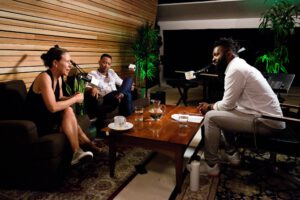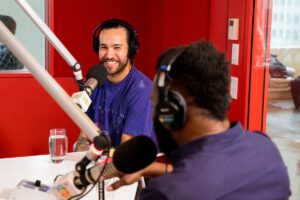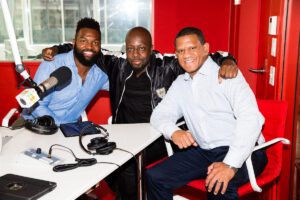Spit, iHeartRadio’s newest Podcast with 23andMe is among the top podcasts for a reason.

Anne Wojicicki, John Legend and Baratunde Thurston in conversation for the podcast Spit.
Hosted by the writer, comedian and cultural critic, Baratunde Thurston, the four episodes so far offer unscripted conversations with an eclectic mix of artists, scientists, and thinkers, on how DNA testing is changing perspectives about identity, family, and race.
Listening to Spit feels a bit like eavesdropping on frank intimate conversations. Whether it’s John Legend talking with 23andMe CEO and co-founder Anne Wojcicki about his ancestors who were slaves, or Fall Out Boy singer Pete Wentz speaking with Dr. Robert Green of the Broad Institute, whether genetics is deterministic, the themes are wide-ranging and fascinating.
“Genetics is wild and interesting,” Wentz said during his free-flowing conversation with Dr. Green.

Pete Wentz talking with Baratunde Thurston for the Podcast – Spit 2018. Photo: Katherine Tyler, for iHeart Radio
Growing up in Middle America, Wentz, whose family originally came from Jamaica and has mixed Portuguese and Jewish roots, said he grew up feeling like “a mutt.” Learning more about his DNA would offer him a chance to explore his family’s origins.
“Since we have this technology why wouldn’t you want to find out?” Wentz said.
As a new parent, Wentz also was curious about the health side of testing and what a person could learn about risks or traits that they might pass on to their children.
People are empowered by the notion that they can learn about risk, said Dr. Green. But he added that there is a certain irony about genetic testing in that many go into this believing that genetics is somehow deterministic, but it’s not.
From his research, Green said one of the biggest comprehension hurdles for people in thinking about genetics is what risk and probability mean.
“That’s the change I see,” he said. “Removing the thinking that ‘you will get this’ to ‘you have a slightly higher or lower probability of getting this.’”
These kinds of surprises popped up in each of the podcasts.

Musician Melissa Etheridge talking about family during Spit podcast. Photo: © Matthew Eisman for iHeartMedia. All Rights Reserved
During the conversation between singer Melissa Etheridge, who has several adopted children, and filmmaker Sarah Lamm, who just completed a film following her search for her sperm donor father, the two talked about family, and what that means.
“I think we’re going through this on a worldwide thing, this sort of blood idea, of blood and family, and mine and my tribe, and how that’s being blown apart by stuff like this,” said Etheridge. “The truth is family is family. You can make family. Family is love, that’s the bond we have. Blood is a whole other story. It’s interesting, it’s great, but it’s a whole thing.”
DNA testing can trigger all sorts of conversations, said Tracy Keim, 23andMe’s vice president of consumer marketing and brand.
“Topics like family, identity, race, and how we’re connected with the rest of the world are all influenced by DNA,” she said.
Last month we wrote about the interesting conversation on race between the singer Wyclef Jean and Northwestern University professor Alvin Tillery. Tillery shared his own harrowing story of surviving a lynching attempt as a 9 year-old in New Jersey in the 1980s. Working with 23andMe on a recent survey, Tillery is looking specifically at how DNA testing is impacting people’s perceptions of race. One f

Baratunde Thurston (left), Wyclef Jean and Al Tillery. Photo: Rachel Kaplan
Wyclef’s takeaway was that the science of DNA could help bring people together by emphasizing how much they have in common — humans are 99.5 percent similar genetically.
“We have so much more in common than you could even imagine,” he said.
We encourage you to have a listen to iHeartRadio’s Spit, with 23andMe. Below are the four episodes so far. There will be more to come.
- Episode 1: How Are We All Related, with John Legend and Anne Wojcicki
- Episode 2: Does Race Really Exist Or Did We Create It, with Wyclef Jean and Alvin Tillery
- Episode 3: What Does It Mean to Be “Family,” with Melissa Etheridge and Sara Lamm
- Episode 4: How can science change the stories we’ve grown up with? Exploring Identity, with Pete Wentz and Dr. Green.




